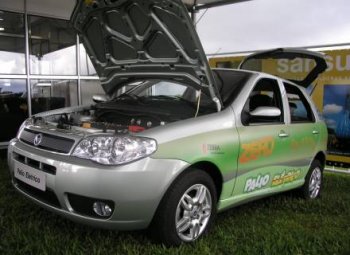An
zero-emission electric
car that is powered by energy drawn entirely from
organic residues, this is the latest environmentally
conscious project development from Fiat Automóveis, the
autonomous Brazilian arm of Fiat Auto that is busy setting
the pace in developing the sustainable transport of the
future.
Last summer Fiat Automóveis presented the Fiat Palio
Elétrico project to the public, a 100 percent
electric-powered car, and an ambitious new project that
instantly drew much attention. Now Fiat have taken the
whole emission-free project a step further down the
environmental path, developing energy sources from
organic materials (both animal and vegetable). Partners
in the project are Itaipú (the
Brazilian-Paraguayan Energy Company) and the Swiss firm
KWO. The idea is to develop a vehicle that can be easily used in
agricultural situations, where its organic energy source
readily available. Brazil has a large,
geographically-spread agricultural sector. The organic
energy powered Palio Elétrico has made its public debut
this month at the biggest agro-business event in the
south of Brazil where it has be a star of the show who
have been receptive to the suggestion that this vehicle
could be considered an answer to the needs of energy by
the agricultural producers of the country.
The
batteries of the Palio Elétrico's engine have been
charged with energy from bio-digestores where the
accumulated organic residues are then used to
produce methane gas which generates electricity in small
thermal plants. The aim now is to produce energy for an
agricultural electric vehicle for varying levels of load
transport requirements, and propelled by energy which is
generated by the agricultural business itself, thus
reducing to the point of elimination, the costs of fuel.
According to
Fiat Automòveis, the Palio Elétrico prototype can be
considered to be a “100 percent ecological one”, for the
absence of pollution emitted and the fact that it runs
almost which producing any noise; the car can be easily
supplied with fuel for minimum expenditure. The Palio
Elétrico can reach a top speed of 110 km/h, and it has a
maximum range of 140 kilometers, but at the moment it
needs eight hours to recharge the batteries.
|
|
 |
|
An electric car that is powered by energy drawn
entirely from organic waste residue, this is the
latest environmentally conscious project development
from Fiat Automóveis, the autonomous Brazilian arm
of Fiat Auto. |
|
|
For Fiat,
Itaipú and KWO this is the first step in an ambitious
plans. They are now busy developing a new utilitarian
vehicle, to be followed by buses, trucks and tractors,
all of which will driven by organic residue derived
power, electric engines. Institutions and universities
in the United States, Europe and Brazil are also
participate in the project.
The official aim of the partners is to be
able to offer within five years an electric vehicle with
450 km range, a top speed of 150 km/h and only a time of
20 minutes to recharge the batteries.
by Claudio
Perlini
|
|
|
|